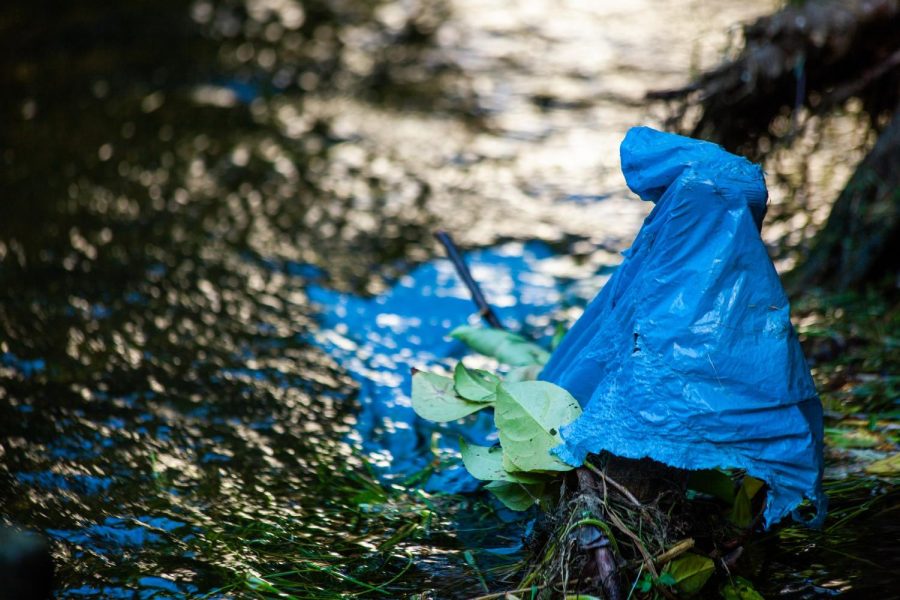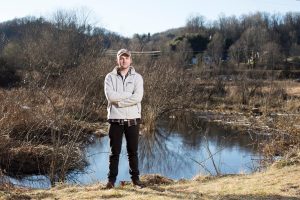Microplastics cause students to create plastic bag ban petition
March 29, 2022
App State students created a petition for the ban of plastic bags in Boone to prevent more microplastics already found in local and state waters, according to a recent water study by local and state waterkeepers.
According to National Geographic, microplastics are tiny plastic particles caused by the breakdown of larger pieces of plastic, which pollute the environment. These microplastics, which are being consumed by animals and are in human blood, pollute Boone waters like Winkler’s Creek.
Watauga Riverkeeper and High Country regional director of MountainTrue, Andy Hill, participated in a state-wide microplastic and trash study conducted by MountainTrue and Waterkeepers Carolina.
Hill said they collected surface water samples from every river basin in the state, filtered the water, then analyzed the sample for microplastics using a microscope. He said microplastics are “generally invisible to the naked eye.”
Microplastics were discovered in 100% of the water samples from western North Carolina, according to the study, and Hill said some of the microplastics found derive from different materials such as plastic straws, clothing, cups, bottles, styrofoam and plastic bags. He also said over 6,000 individual pieces of trash were collected, with over 88% of it being single-use plastics.
“Overwhelmingly, we found more styrofoam than anything else,” Hill said.
Hill said waterkeepers and volunteers collected local samples from the Watauga and New River basins. He said these basins are “home to incredible biodiversity” and need to be protected.
App State students Adrianna Nelson, Amber Parker and Cate Smith created a petition after being assigned to do a group project for their avian biology class. Biology professor Lynn Siefferman said the project had to focus on research and data collection, encouraging social action on conservation issues or reaching out to people in the community.
Nelson, a senior biology major, said water pollution is an issue affecting everything from all ecosystems, “including us.” Because of this, she said she believes the project will move people.
“Pollution that we cause and impacts those environments and those critters also, are linked to us and our well-being on lots of levels, physically and emotionally,” Nelson said.
Siefferman said because microplastics are beginning to make their way into the ecosystem. She’s worried about how it will affect her children’s health.
Siefferman, who has an 11-year-old son, said, “It never occurred to me that I would have to worry about microplastics in his body and how much he is going to bioaccumulate in his life.”
Eight states have already banned single-use plastic bags: California, Connecticut, Delaware, Hawaii, Maine, New York, Oregon and Vermont.
“They’re doing fine, so why can’t we? Why can’t we be part of this?” Siefferman said.
Siefferman and Parker said they think petitions are an effective way to raise awareness of an issue and show stakeholders in Boone and the state the number of people willing to get involved.
“Our hope, at least here in Boone, is we can help get that trash in the water and everything under control,” Parker said.
Nelson said she’s shared the petition to multiple groups in the community and on campus such as High Country Audubon Society, the National Parks club, the Highlands Biology club, the university’s Sustainable Development Department and Boone Town Council.
The group has also been in contact with Hill. He said he supports people “taking action to protect the environment.”
On March 9, Hill presented the study and data collected to the Boone Town Council. He said BTC seemed receptive to the idea, and they asked many questions. Hill said the town staff is reviewing their options on what they can do and will get back to the council with a recommendation on what kind of changes can be made.
“I think that both council and staff have been very encouraging, very open to learning.” Hill said.
Hill believes if immediate action isn’t taken soon, then “the problem is just going to get exponentially worse.”
“Plastic isn’t a material that is infinitely recyclable the way that aluminum or steel or something like that is,” Hill said. “I think we need to phase out plastics wherever we can.”
He said as the population grows, so does the amount of plastic waste in our waters.
Chief Sustainability Officer Lee Ball said there are other things which contribute to and utilize microplastics, which people don’t think about such as skin care products, body scrubs and clothes. Ball also said he believes the wind in Boone contributes to the amount of pollution getting in the water because the litter on the ground blows into it.
“We need to help each other figure out what to do with our stuff once we’re done with it,” Ball said. “And a lot of it has to do with deciding what we buy in the first place.”
Ball and Hill believe one way people can reduce the amount of microplastics and pollution is avoiding buying plastic products contributing to the problem. Instead people should buy and use reusable, durable and recyclable goods as well as becoming more educated and educate others on the importance of waste and recycling management.
“We need to get away from that mentality that once we’re done with it, we’re not responsible,” Ball said. “We are responsible because we bought it in the first place.”















